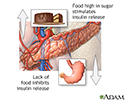Drug-induced hypoglycemia
Drug-induced hypoglycemia is low blood sugar that results from medication.
Hypoglycemia
Low blood sugar is a condition that occurs when the body's blood sugar (glucose) decreases and is too low. Blood sugar below 70 mg/dL (3. 9 mmol/L) i...

Causes
Low blood sugar is common in people with diabetes who are taking insulin or other medicines to control their diabetes.
Low blood sugar
Low blood sugar is a condition that occurs when the body's blood sugar (glucose) decreases and is too low. Blood sugar below 70 mg/dL (3. 9 mmol/L) i...

All of the following can cause blood sugar (glucose) levels to drop:
- Drinking alcohol
- Getting too much activity
- Intentionally or unintentionally overdosing on the medications used to treat diabetes
- Missing meals
Even when diabetes is managed very carefully, the medications used to treat diabetes can result in drug-induced hypoglycemia. The condition may also occur when someone without diabetes takes a medicine used to treat diabetes. In rare cases, non-diabetes-related medicines may cause hypoglycemia.
Medications that can cause drug-induced hypoglycemia include:
- Bactrim (an antibiotic)
- Beta-blockers
- Haloperidol
- Insulin
- MAO inhibitors
- Metformin when used with sulfonylureas
- Pentamidine
- Quinidine
- Quinine
- SGLT2 inhibitors (such as dapagliflozin and empagliflozin)
- Sulfonylureas
- Thiazolidinediones (such as Actos and Avandia)
References
Cryer PE. Glycemic goals in diabetes: Trade-off between glycemic control and iatrogenic hypoglycemia. Diabetes . 2014;63:2188-2195.
Cryer PE. Hypoglycemia. In: Melmed S, Polonsky KS, Larsen PR, Kronenberg HM, eds. Williams Textbook of Endocrinology. 12th ed. Philadelphia, PA: Elsevier Saunders; 2011:chap 34.
Inzucchi SE, Sherwin RS. Type 1 diabetes mellitus. In: Goldman L, Schafer AI, eds. Goldman's Cecil Textbook of Medicine. 24th ed. Philadelphia, PA: Elsevier Saunders; 2011:chap 236.
-
Food and insulin release - illustration
Insulin is a hormone secreted by the pancreas in response to increased glucose levels in the blood.
Food and insulin release
illustration
-
Restless legs syndrome and related disorders
(In-Depth)
-
Aloe
(Alt. Medicine)
-
Cayenne
(Alt. Medicine)
-
Turmeric
(Alt. Medicine)
-
Chromium
(Alt. Medicine)
-
Alcohol use disorders
(In-Depth)
-
Eating disorders
(In-Depth)
-
American ginseng
(Alt. Medicine)
-
Ginger
(Alt. Medicine)
-
Stinging nettle
(Alt. Medicine)
Review Date: 11/25/2014
Reviewed By: Robert Hurd MD, Professor of Endocrinology and Bioethics at Xavier University, Cincinnati, Ohio. Review provided by VeriMed Healthcare Network. Also reviewed by David Zieve, MD, MHA, Isla Ogilvie, PhD, and the A.D.A.M. Editorial team.

